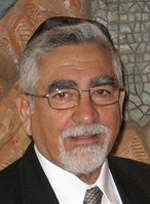By Dorian DeWind
The Moderate Voice

AUSTIN, Texas — It has been nearly 75 years since the last train crammed with Dutch Jews destined for the Auschwitz death camp left Westerbork, a camp situated in the northeastern part of the Netherlands that served as a transit camp for Dutch Jews before they were deported to Nazi extermination camps.
The “Holocaust train,” was carrying the last 279 of approximately 107,000 Dutch Jews transported to camps such as Auschwitz and Sobibor. Of these 107,000 men, women and children – 70 percent of the Dutch Jewish community — only around 5,000 survived.
Subject to the so-called Nazi “Final Solution (“Endlösung der Judenfrage.”), the Jewish population in the Netherlands during World War II (140,000 by some estimates) felt the brunt of the Nazi boot. Soon after the occupation, the Nazis initiated many measures to identify, shame and isolate the Jews in the Netherlands from the rest of the population. “Registration,” discrimination, persecution and internment of Dutch Jews in camps in the Netherlands were not far behind, eventually followed by deportation to the death camps.
Nederlandse Spoorwegen, or NS (the Dutch national railway company), operated those trains on behalf of the Nazi occupiers, first to the “transit camps” and then to the Dutch border where the Dutch Jews were transferred to German trains that would take them to the concentration camps. The state railroad company got paid for it!
Dirk Muller from the National Westerbork Memorial told Dutch TV last year, according to AP News:
The NS complied with the German order to make trains available…The Germans paid for it and said the NS had to come up with a timetable. And the company went and did it without a word of objection.
Although the Holocaust occurred more than 70 years ago, the Dutch people — as many other Europeans – have never forgotten “it” nor the victims.
While 13 years ago NS apologized for its role in the deportations, it has now agreed to set up a commission to investigate how it can make individual reparations to Dutch Holocaust survivors and direct family members of Dutch Jews who were murdered in the concentration camps, calling its involvement “a black page in the history of our country and our company.”
I found out about this development during a telephone conversation with my cousin, Loekie de Wind, a couple of days ago.
The news took extra significance because Loekie’s father, Louis de Wind, was on that “last train to Auschwitz” in September 1944.
After being arrested during a razzia (raid), Louis de Wind was shipped on one of those NS trains to Westerbork and later to Auschwitz.
Loekie, then six, would never see her dad again, but years later she would read the letter her father had written to her and to her mother on his way to Auschwitz 74 years ago. A letter that he tossed out of the sealed, dark, cramped railroad cattle wagon speeding towards the German border.
Loekie does not know the schedule nor the amount of reparations. What is important to her is the fact that NS has recognized and apologized for their collaboration.
Sadly, NS was not the only organization or company that, in one way or another, reluctantly or freely, cooperated with the Nazi wartime occupiers.
France’s state-owned railway company, the Société nationale des chemins de fer français (SNCF) also had a role in the deportation of 76,000 French Jews during World War II. In 2006, SNCF was ordered to pay compensation for its role. Although the decision was later overturned, SNCF apologized and agreed to a compensation fund. The French government has paid “more than $6 billion in reparations to French citizens and certain deportees.”
The Dutch newspaper De Vokskrant in an eye-opening story tells how “The Dutch Railways were no exception to the rule during the German occupation: almost every entrepreneur wanted to do business with the Nazis.”
The civilized world says “Never Again” to the Holocaust. Can the business community, the “captains of industry,” make a similar promise when it comes to cooperation or collaboration with a future occupier, should “the occasion” ever arise?
*
A native of Ecuador, educated in the Netherlands, Dorian de Wind is a retired U.S. Air Force officer who writes on occasion about his Dutch-Jewish heritage. This article is republished from The Moderate Voice under auspices of the San Diego Online News Association.
I hope to be able to post this in the “General” forum in Trains (magazine) website, with credit to author and San Diego Jewish World.
Per the note at the bottom of the story, this was reprinted with permission from The Moderate Voice website. Please make your request to publisher Joe Gandelman via http://www.themoderatevoice.com